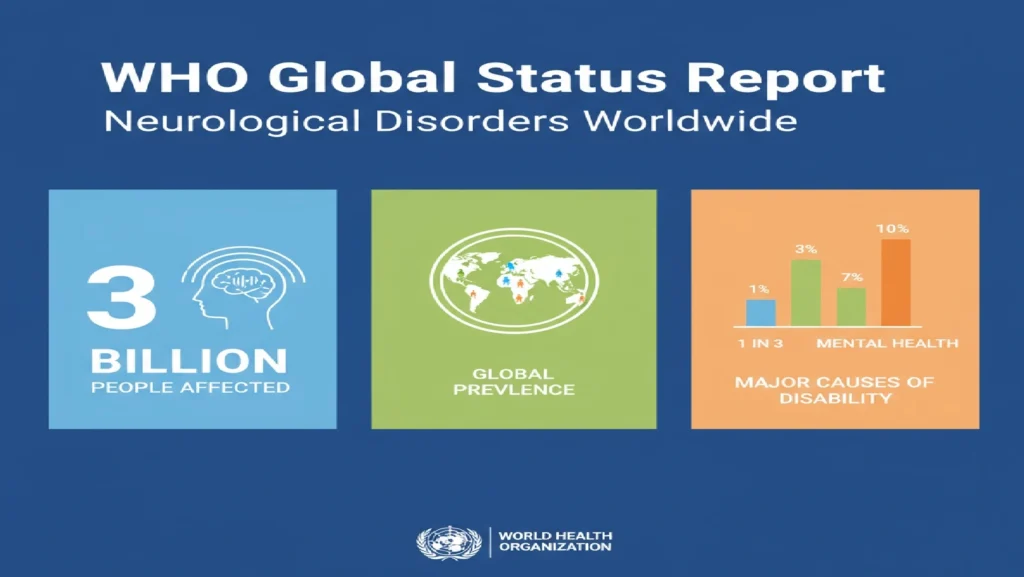The World Health Organization has issued an urgent warning that the world is facing a catastrophic brain health crisis, with neurological conditions now affecting over 3 billion people—more than 40% of the global population—while claiming 11 million lives each year. Despite this staggering toll, fewer than one in three countries has implemented a national policy to address neurological disorders, according to WHO’s landmark Global Status Report on Neurology released October 14, 2025.
The Scale of the Crisis
The WHO report, launched at the World Congress of Neurology in Geneva, reveals that neurological disorders have become the leading cause of disability and health loss worldwide, yet remain severely underprioritized in global health policies. The top 10 neurological conditions driving deaths and disability include stroke, neonatal encephalopathy, migraine, Alzheimer’s disease and other dementias, diabetic neuropathy, meningitis, epilepsy, neurological complications from preterm birth, autism spectrum disorders, and cancers of the nervous system.
“With more than 1 in 3 people in the world living with conditions affecting their brain, we must do all we can to improve the health care they need,” said Dr. Jeremy Farrar, WHO Assistant Director-General for Health Promotion, Disease Prevention and Control. “Many of these neurological conditions can be prevented or effectively treated, yet services remain out of reach for most—especially in rural and underserved areas—where people too often face stigma, social exclusion and financial hardship“.
Severe Neurologist Shortages Plague Low-Income Nations
The report exposes dramatic healthcare inequities, revealing that low-income countries have more than 80 times fewer neurologists per 100,000 people compared to high-income nations, despite bearing disproportionately high disease burdens. This severe shortage means that for billions of patients worldwide, timely diagnosis, treatment, and ongoing care remain completely inaccessible.
Only 25% of countries include neurological disorders in their universal health coverage packages, leaving millions without access to basic services such as stroke units, rehabilitation facilities, and palliative care. The WHO report, based on data from 102 member states representing 71% of the global population, establishes baseline values for tracking progress under the Intersectoral Global Action Plan on Epilepsy and Other Neurological Disorders 2022-2031.
India’s Response to the Crisis
India has taken concrete steps to address neurological care by establishing a National Task Force on Brain Health in 2024, with plans to implement a nationwide brain health programme by scaling up the Karnataka Brain Health Initiative (KaBHI). KaBHI, launched as a collaboration between Karnataka’s Department of Health and Family Welfare and the National Institute of Mental Health and Neuro Sciences (NIMHANS) in Bengaluru, represents a comprehensive public health programme aimed at reducing the burden of neurological disorders.
The WHO report specifically highlighted KaBHI as a “catalysing policy initiative for brain health and neurological disorders in India,” noting that “by uniting key stakeholders and sectors around a needs-based, evidence-informed, and integrated approach to neurological disorders, KaBHI has paved the way for policy prioritisation of brain health in India”.
However, India continues to face a severe neurologist shortage, with only approximately 2,000 to 2,500 qualified neurologists serving the country’s massive population—requiring more than 20,000 to meet demand adequately. Currently, India has 353 DM Neurology postgraduate seats across 92 medical colleges, representing an increase of 114 seats over the past five years, though this remains insufficient.
The government is also expanding stroke care infrastructure, with nearly 500 stroke units now operational and plans to further expand this network. These units implement a hub-and-spoke model for stroke care through the National Programme for Prevention and Control of Non-Communicable Diseases, aiming to ensure optimized resource allocation and equitable access to specialized treatments nationwide.
Prevention Opportunities Being Missed
The WHO report emphasizes that many neurological conditions are highly preventable, yet prevention efforts remain inadequate. Up to 84% of stroke-related health loss could be averted through better control of key risk factors including high blood pressure, air pollution, and smoking. Similarly, preventing lead exposure could reduce the burden of idiopathic intellectual disability by 63.1%, while reducing high fasting plasma glucose levels could cut dementia burden by 14.6%.
“This WHO study makes the scale of the challenge unmistakable,” said Professor Wolfgang Grisold, President of the World Federation of Neurology. “Neurological disorders are the world’s leading cause of disability, affecting over three billion lives. We must now ensure that neurology moves to the centre of global health priorities—with stronger prevention, earlier diagnosis, and fair access to treatment for all“.
Urgent Call for Global Investment
The WHO and World Federation of Neurology are jointly calling for urgent global action, including greater investment in neurological services, research, workforce training, and policy development. The report provides data-driven, actionable recommendations to help countries advance the strategic objectives outlined in the Intersectoral Global Action Plan.
“We must work together to ensure we put patients and their families first and that brain health is prioritized and properly invested in,” Dr. Farrar emphasized. The report serves as the first comprehensive global baseline assessment of countries’ responses to neurological conditions, identifying critical gaps, barriers, and inequities that must be addressed to prevent millions of avoidable deaths and disabilities.



















